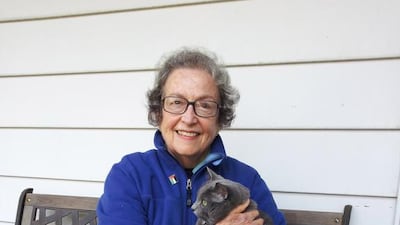The American children’s author Elsa Marston grew up in Massachusetts and now lives in Indiana, but the books she’s written in her 25-year career are all about the Middle East and North Africa.
Marston, who has lived and travelled extensively in Lebanon, Tunisia, Palestine and Egypt, says her aim is to educate young Americans about the Middle East, so they realise that, in many ways, the lives of young Arabs are not so different from their own.
Her forthcoming book The Olive Tree was originally written as a short story for a contest in the American children's magazine Highlights for Children, and in 1994 it won the Short Story Award from the International Reading Association. It is now being published as a picture book – with gorgeous watercolour illustrations by Claire Ewart – for children ages 5 and above, and is due out on Saturday.
As Marston explains, she remains dedicated to dispelling myths and prejudices about the region.
Tell us about The Olive Tree.
It’s a story of loss and reconciliation set in a Lebanese village following the long civil war between 1975 and 1991. An old olive tree grows over the property of neighbours, who quarrel over the olives. When the tree is destroyed, it surprisingly offers a way for the children of the two families to be friends. This book happily realises my long-standing hope to work on a book with my friend [Ewart].
When did you start writing and why did you choose to write for children?
I grew up listening to bedtime stories my father told me, with the idea that one day I would be able to tell my own. I remember starting to write three novels at the age of 8 or 9. Naturally they didn't get beyond the second page, but many years later, I realised that one of them had actually turned into my novel, The Ugly Goddess. As an adult, I decided to write the sort of stories that appealed to me as a child: adventures and mysteries in exotic places such as ancient Egypt, Carthage, the Greek islands and also funny stories about animals.
How did you develop an interest in writing about the Arab world?
I owe it to my long association with the American University of Beirut, my Lebanese husband and frequent travels to Lebanon, Egypt, Tunisia and Palestine. But it’s more than just an interest – it’s a mission. There is still far too much ignorance and prejudice in the United States that colours public reactions to the Middle East. I try to counter those attitudes by offering honest and fair alternatives.
What kind of themes do your books portray?
I avoid writing about war and violence and instead focus on the normal realities of life in Arab societies. Yet all my stories have a background of a social or political problem. For instance, in The Olive Grove, the main theme is realisation of what moral struggle is all about, and that even the enemy can be a moral person. In essence, my stories are about the growing-up struggles young people face.
How do you make your stories attractive for young adults?
I try to keep my writing light and natural. Working in some humour, whether through the plot situations, dialogue or the main character’s thoughts and speech, adds a lot of appeal to a story. No preaching or moralising, of course, or having an adult character point out the lesson to be learnt. I let the main character in the story figure something out for himself/herself, and grow in that way.
What do you think about the state of western literature for children featuring Arab themes?
Until recently, most picture books published in the US about Arab culture were either openly pro-Israel or were fairy tales, like The Arabian Nights. These books are charming and beautifully illustrated, but say nothing about real life. It was only in the 1990s that a few courageous writers and editors published a few books about contemporary Arab culture, such as Habibi by Naomi Shihab Nye, and opened the door for others. Today there are about 50 to 60 good books published in North America and the UK that are honest, fair and accurate. But, almost all are written by non-Arabs. We need more books by Arab writers.
• The Olive Tree (Wisdom Tales Press) is available on Amazon
artslife@thenational.ae

